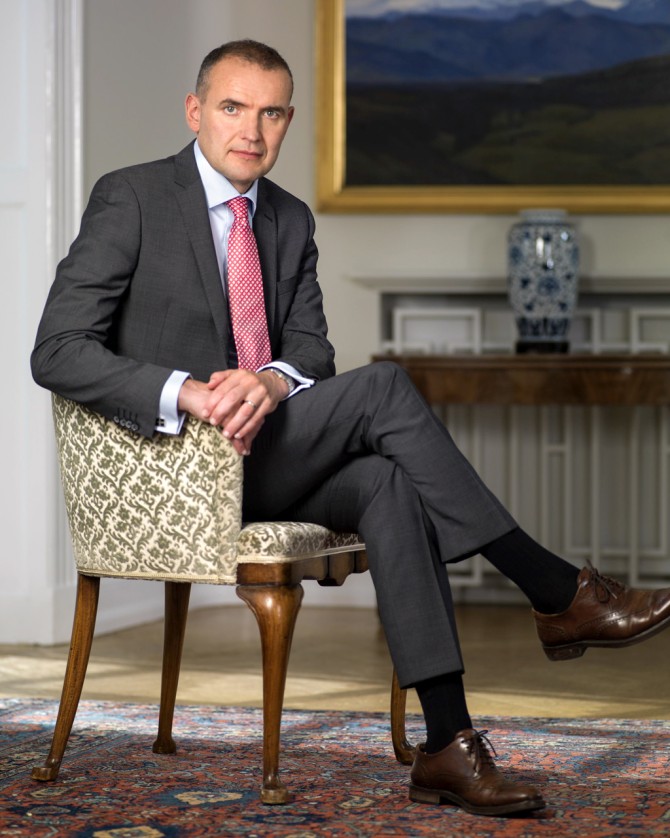Iceland president visit to showcase sustainability, affinity
By David Nutt, Cornell Chronicle
Although geographically distant, Cornell and Iceland are close in spirit, particularly when it comes to a commitment toward sustainability.
That affinity will be on display when the president of Iceland, Guðni Th. Jóhannesson, visits Cornell’s Ithaca campus Nov. 10-11.
“Cornell and Iceland both have ambitious goals of achieving carbon-neutral energy systems in the medium term – in our case, by 2035,” said Cornell President Martha E. Pollack. “We’ve learned a tremendous amount from Iceland’s transition to geothermal district heating, and its expanding use of geothermal energy in agriculture and industry.”
Jóhannesson’s campus visit will include tours of three of the university’s key sustainability initiatives: the Cornell University Borehole Observatory (CUBO), the Lake Source Cooling facility and Cascadilla Community Solar Farm. Cornell researchers have visited and studied Iceland’s renewable energy efforts with an eye toward shaping the university’s plans to warm the Ithaca campus with Earth Source Heat.
Iceland has long been a global leader in sustainability, with 85% of its annual energy derived from domestic, renewable resources, and approximately 85% of all Icelandic homes heated with geothermal energy. The country is, per capita, the world's largest green energy producer and, through its embrace of hydropower and geothermal and wind energy, a model for pioneering sustainable solutions.
“We all benefit from going clean and green in our energy production and consumption. In Iceland, we are blessed with an abundance of geothermal sources but new developments allow people to utilize this resource in wider regions and at lower temperatures than was previously thought possible,” Jóhannesson said.
“In Europe we also see how many nations have turned their attention to geothermal energy during the latest energy crisis, after Russia's invasion of Ukraine. They want to increase their energy independence,” he said. “Furthermore, the more established reasons for going green are as strong as before – to reduce CO2 emissions, and to advance from smog to clean air when we heat our homes.”
Jóhannesson’s visit will also highlight other aspects of Cornell and Iceland’s close, enduring relationship, including a tour of Cornell University Library’s Fiske Icelandic Collection and the College of Veterinary Medicine’s Icelandic Horse Barn. He will deliver a public lecture, “Can Small States Make a Difference? The Case of Iceland on the International Scene,” as part of the Einaudi Center’s Distinguished Speaker Series at 4:30 p.m., Nov.10, in Rhodes-Rawlings Auditorium, Klarman Hall. Tickets are already sold out, but the lecture will be live streamed in the atrium and from any remote location.
Jóhannesson, who took office in 2016 and was reelected in 2020, is a former professor of history who has published a number of books on modern Icelandic history – and even translated four novels by Stephen King into Icelandic. He said he is particularly excited to visit the Fiske Icelandic Collection, the largest repository in North America for the study of Icelandic and Old Norse literature and civilization, and one of the three largest collections of its kind in the world.
The collection was started by Cornell’s first university librarian, Daniel Willard Fiske, who bequeathed approximately 8,600 volumes to Cornell upon his death in 1904. The collection, part of the library’s Division of Rare and Manuscript Collections, quadrupled in size by the end of the century.
Jóhannesson said the longstanding relationship between Iceland and Cornell “all goes back to “Willard Fiske and his marvelous collection of Icelandic books and manuscripts.
“It is truly a treasure, and we certainly value Cornell’s commitment to this part of our national heritage that has been so well preserved at Ithaca,” he said. In 2014, during his own visit to Cornell, former Icelandic President Ólafur Ragnar Grímsson awarded Fiske collection curator Patrick J. Stevens the Order of the Falcon – an honor rarely bestowed on foreign nationals.
At the Icelandic Horse Barn, Jóhannesson will see the herd of purebred Icelandic horses; researchers study the animals’ unusual immune systems to find novel treatments for Culicoides hypersensitivity, Equine Herpes Virus and Lyme disease. The president also plans to visit with university leadership and Icelandic students.
“Hopefully my visit will serve to strengthen yet further the good cooperation that exists between Cornell and Iceland,” Jóhannesson said.
Media Contact
Abby Kozlowski
Get Cornell news delivered right to your inbox.
Subscribe

